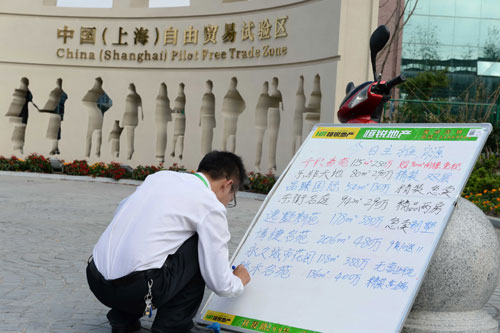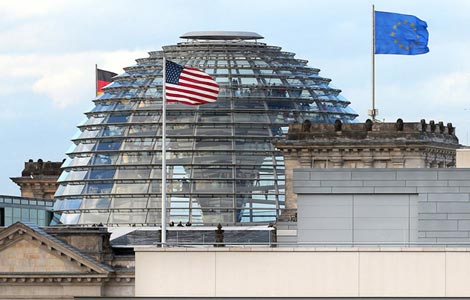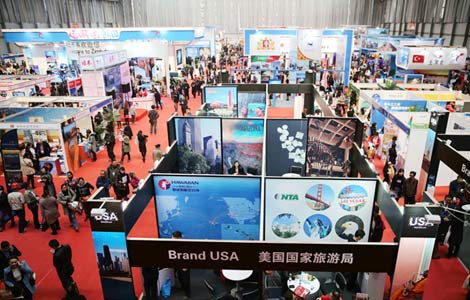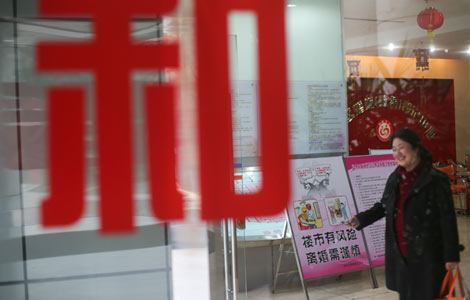Influx of new businesses, residents sets off property boom
Updated: 2013-10-30 17:19
By Wang Ying in Shanghai (China Daily USA)
|
||||||||
The Shanghai Pilot Free Trade Zone is driving up prices and transaction volumes of housing in neighboring districts, as the State-led area is expected to become an economic driver for the country's financial hub over the next decade.
Covering 28.78 square kilometers, the FTZ was officially launched at the end of September. It's being built on the basis of existing bonded zones - the Waigaoqiao Free Trade Zone, Waigaoqiao Free Trade Logistics Park, Yangshan Free Trade Port Area and Pudong Airport Comprehensive Free Trade Zone.
The FTZ is luring investors into residential property in adjacent areas. Pudong Chuansha, Waigaoqiao, Zhuqiao and Lingang New City are four such areas, where housing prices have risen in recent months by some 20 percent.
Statistics from property agency Centaline show that from Sept 1 to 11, transaction volumes in those neighborhoods were up 280.5 percent month-on-month.
A member of the sales staff at Centaline's Waigaoqiao division told Xinhuanet.com that even though many sellers had raised prices by 10 percent within just a month, there were still plenty of prospective buyers.
"Sometimes an apartment offered for sale will attract more than 10 prospective clients on a single night," the person said.
"The significance of establishing an FTZ in Shanghai is similar to that of launching the Shenzhen Special Economic Zone, which turned Shenzhen from a fishing village into a manufacturing center and boom town," Cai Weimin, columnist at Shanghai-based Money Weekly, wrote.
According to Cai, the Shanghai FTZ will drive up the city's housing prices, in conjunction with the Disneyland theme park and the Hongqiao Comprehensive Transportation Hub.
The three projects will spark a new round of rapid development in finance, trade, logistics, transport and tourism, creating a bright future for Shanghai, Cai wrote.
But not all housing projects in or near the FTZ will experience sharp price hikes. For instance, the Pudong Airport Comprehensive Free Trade Zone is mainly positioned as a logistics and transport center, and it lacks commercial facilities, so the prices of local residential projects aren't rising sharply, an analyst said.
According to property-market research firm DTZ, the average home price in Lingang now ranges from 10,000 yuan ($1,638) to 11,000 yuan per sq m, while the average in Waigaoqiao is about 33,731 yuan. In the Pudong Airport zone, it's 13,627 yuan per sq m.
"Neighboring land prices will definitely go up, just like what happened with the Lujiazui Finance and Trade Zone," said Xie Chen, research director of CBRE Shanghai.
According to Xie, the Lujiazui area's annual investment in infrastructure was less than 200 million yuan in the early 1990s, but it surged to 20 to 30 billion yuan in 2009 and 2010.
Another example of what happens to property prices when a new, special zone is on the horizon is the sparsely populated Qianhai Bay economic zone. Within less than a year after the State Council, China's cabinet, approved development and opening-up policies for the Qianhai Shenzhen-Hong Kong Modern Service Industry Cooperation Zone, two sites drew total bids of 12.37 billion yuan in July, exceeding the annual total value of all land auctioned in Shenzhen in the past six years.
"We can expect similar developments in free trade zone areas," said Jonathan Wei, head of occupier services at DTZ China.
Analysts suggested that it would be better if land values rose gradually in line with the development of infrastructure and industry in the FTZ, because a runaway rise in values will undermine the zone's development.
Compared with residential property, commercial projects and land for industrial use may benefit more from the Shanghai FTZ concept, as more land will be needed for logistics infrastructure and more office space will be required by new companies or divisions setting foot in the FTZ, said Song Huiyong, research director with Shanghai Centaline Property Consultants Ltd.
"Growing trade means more logistics space for storage, which will be good news for industrial park developers.
"As a result, the industrial property sector will be the first to benefit from the free trade zone development among all property sectors," said Shaun Brodie, head of China strategy research at DTZ.
Shanghai's economy was formerly driven by finance, shipping and trade, but the city is becoming more service-oriented.
Demand for high-end storage facilities and factories will rise as trade and manufacturing in the city becomes more sophisticated, said analysts.
Most of the office space in the Shanghai FTZ area is low-end. Demand for medium-level office space within the zone will grow, and the most popular office type will be similar to business parks, said Regina Yang, head of research and consultancy at Knight Frank in Shanghai.
The average cost of office space in Lingang was only 8,858 yuan per sq m over the past year, while the city's average Grade-A office is 55,439 yuan per sq m, according to DTZ East China research
Restaurants and supermarkets are likely to spring up in the FTZ, but analysts said they didn't expect to see shopping malls any time soon, due to insufficient foot traffic.
The retail sector will grow after the office segment develops, and as the FTZ is fully built up, the residential sector will also get a boost, said Yang.
It's nearly certain that the FTZ will offer tax exemptions, which means high-end imported food and luxury goods will be duty-free within the trade zone.
"Goods will be sold at cheaper rates compared with those in Chinese mainland markets", said Brodie.
Xie cautioned that the FTZ may not be a boon for luxury items in general. Taxes aren't the only reason that luxury goods cost much more in the Chinese mainland than cities such as Hong Kong or New York.
"Luxury brands use a different pricing strategy here in China," said Xie.
|
A real estate agent lists available property in the China (Shanghai) Pilot Free Trade Zone. Statistics from property agency Centaline show that from Sept 1 to 11, transaction volumes in the neighborhoods adjacent to the FTZ were up 280.5 percent month-on-month. Provided to China Daily |
(China Daily USA 10/30/2013 page15)
Most Viewed
Editor's Picks

|

|

|

|

|

|
Today's Top News
China's population policy unchanged
Boston victim's scholarship fund reaches $1m
Beckham picks Miami for MLS franchise
UN urges end of US embargo on Cuba
IMAX: Coming to a home near you
SUNY recruits students in China
NSA denies reports on US spying in Europe
US approves chemical probes against China
US Weekly

|

|














